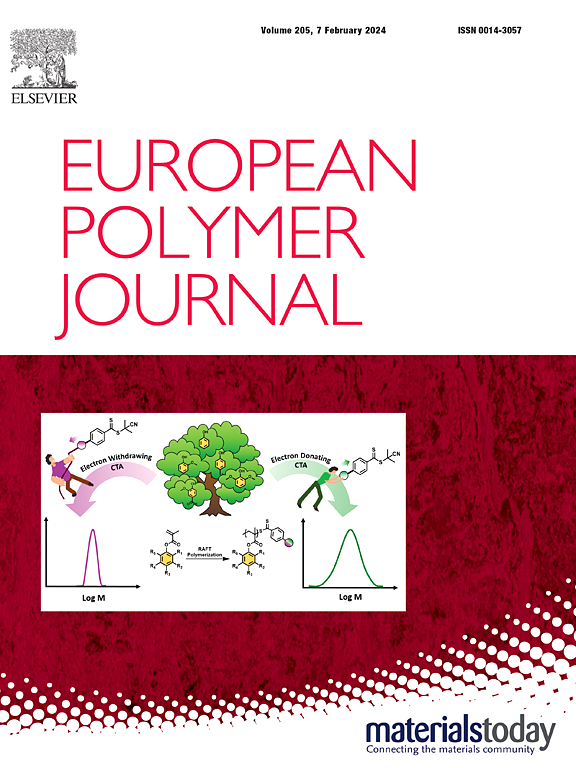Bulk depolymerization of PMMA using difunctional pyromellitic or monofunctional phthalimidic ATRP initiators
IF 5.8
2区 化学
Q1 POLYMER SCIENCE
引用次数: 0
Abstract
This study presents a new approach for enhancing the depolymerization efficiency of poly(methyl methacrylate) (PMMA) by incorporating multiple depolymerization sites within the polymer chains. Four distinct PMMA polymers were synthesized, each bearing different combinations of phthalimide ester and chloride, or bromide functionalities placed in specific positions in the polymer chain. The polymers were prepared by atom transfer radical polymerization. Increasing the number of activation sites enhanced the depolymerization yield. Experiments conducted under reduced pressure in bulk revealed depolymerization yields ranging from 73 % to 86 % achieved within 30 min at 220 °C. Thermogravimetric analysis performed on polymers with four different molecular weights demonstrated the efficiency of this approach also for polymers with higher molecular weights. A similar strategy was also performed on crosslinked networks by incorporating activatable pyromellitic moieties to reach 85 % of depolymerization yield. This strategy demonstrates the potential for efficient depolymerization of PMMA at relatively low catalyst loadings and temperatures, offering promising prospects for sustainable polymer recycling processes.

求助全文
约1分钟内获得全文
求助全文
来源期刊

European Polymer Journal
化学-高分子科学
CiteScore
9.90
自引率
10.00%
发文量
691
审稿时长
23 days
期刊介绍:
European Polymer Journal is dedicated to publishing work on fundamental and applied polymer chemistry and macromolecular materials. The journal covers all aspects of polymer synthesis, including polymerization mechanisms and chemical functional transformations, with a focus on novel polymers and the relationships between molecular structure and polymer properties. In addition, we welcome submissions on bio-based or renewable polymers, stimuli-responsive systems and polymer bio-hybrids. European Polymer Journal also publishes research on the biomedical application of polymers, including drug delivery and regenerative medicine. The main scope is covered but not limited to the following core research areas:
Polymer synthesis and functionalization
• Novel synthetic routes for polymerization, functional modification, controlled/living polymerization and precision polymers.
Stimuli-responsive polymers
• Including shape memory and self-healing polymers.
Supramolecular polymers and self-assembly
• Molecular recognition and higher order polymer structures.
Renewable and sustainable polymers
• Bio-based, biodegradable and anti-microbial polymers and polymeric bio-nanocomposites.
Polymers at interfaces and surfaces
• Chemistry and engineering of surfaces with biological relevance, including patterning, antifouling polymers and polymers for membrane applications.
Biomedical applications and nanomedicine
• Polymers for regenerative medicine, drug delivery molecular release and gene therapy
The scope of European Polymer Journal no longer includes Polymer Physics.
 求助内容:
求助内容: 应助结果提醒方式:
应助结果提醒方式:


